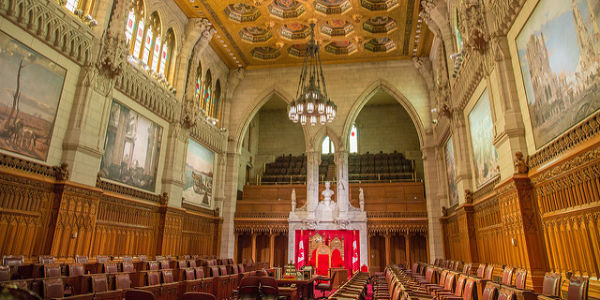The UK and Canada: democratic legitimacy could matter more than geographic representation in the upper chamber
Upper chambers have the potential to represent different geographic groups within a multinational state, and so accommodate minority identities. However, research by Mike Medeiros, Damien Bol and Richard Nadeau indicates that, though there is support for democratic reform of the House of Lords and Senate in Scotland and Quebec respectively, there is, in fact, greater support for central democratic reform than for subnational representation.

The Senate chamber, Houses of Parliament, Canada. Picture: Tony Webster, via (CC BY 2.0)
Upper chambers have long been used to ensure that all geographical segments have a say in the political decision-making of a federation. This idea was at the core of The Federalist Papers that gave birth to American Constitution in the 18th century: there should be an equal number of representatives for each state in the US Senate, and this chamber should have a veto power in the legislative process.
In multinational countries, upper chambers often serve as instruments of conflict avoidance. This is the classic theory developed by Lijphart in his seminal book Patterns of Democracy. He argues that the risk of intergroup conflicts diminishes when all the groups have a strong voice in the upper chamber of parliament, and when this house has effective power in the decision-making process. Upper chambers force majority groups to take into consideration minority groups’ preferences.
However, we still do not know whether this particularity of upper chambers is perceived as such by the minority groups of multinational countries. In a recent paper we report the results of a survey experiment conducted in Quebec and Scotland. We asked people how they feel about various scenarios regarding the existing upper chamber of their country. We find that they strongly support reform, but that reform that would increase the democratic legitimacy of the institution is more popular than one that would foster the regional representation of the minority group, even among people who report a strong Quebecer or Scottish identity.
Design
Both the UK and Canada are multinational countries currently enthralled in debates about reform of their upper chambers. Neither country’s upper chamber meets Lijphart’s criteria for a ‘good’ one: it does not grant a fair representation to the minority groups and does not have effective power in the legislative process. Recent scandals in both the UK and Canada have also fuelled calls to reform the institutions. What is more, these multinational states contain within them subnational units (countries in the UK and provinces in Canada), with strong nationalist leanings that continuously strive for greater political representation.
In 2015, we conducted two online survey experiments, one in Quebec and one in Scotland. The samples were representative of the populations and composed of 752 adults in Scotland and 770 in Quebec. We presented respondents a short text on the House of Lords or Senate as a preamble. We randomly assigned to each respondent one of three preambles. In the first one, we presented a text that simply described the current function and composition of the upper chamber in the respondent’s country. In the second preamble, we added to the description of the status quo a description of a reform proposal consisting of directly electing the upper chamber. In the third preamble, we added to the description of the status quo a description of a reform proposal consisting of ensuring specific regional representation of Scotland or Quebec in the upper chamber. We asked respondents how much they like, on a scale from 0 (strongly dislike) to 100 (strongly like), the institution or reform scenario that they just saw on their screen. With the data generated by this survey, we were thus able to evaluate which institution and reform is the most popular in Scotland and Quebec.
Results
Figure 1 reports the degree of approval of the status quo and reform proposals in Quebec and Scotland. Firstly, it shows that, in both, the mean support for the status quo (47) is much lower than the mean support for the reforms (between 61 and 71). Secondly, the mean approval tends to be larger for the democratic legitimacy reform than for the regional representation one, but the difference is small (around 5 points in both). Thirdly, the approval ratings are remarkably similar in the two countries. The biggest difference concerns democratic reform, which is slightly more popular in Scotland than in Quebec (mean of 71 against median of 65).
Figure 1. Mean institutional approbation
Next, we tested whether some groups of respondents were more favourable to reform of the upper chamber (and if so, which ones) with an OLS regression. Among other factors, we differentiated respondents depending on their regionalist identity using the classic Moreno question of asking respondents to pick from a range of options for strength of national or subnational/regionalist identities. Figure 2 shows that the regionalist identity of the respondents does not seem to affect institutional support in Quebec. By contrast, in Scotland, those with a Scottish (over British) identity are less supportive of the status quo by 10 points, and more supportive of the democratic reform by the same margin. Respondents with a predominantly Scottish identity are also slightly more supportive of the regionalist reform but the difference between the two predicted values is of only 5 points.
Figure 2. Effect of regionalist identity on institutional approval
Conclusions
Lijphart argues that the upper chamber in multinational countries can be designed to accommodate minority groups, and thus ensure a representative role for them. However, research had not tested whether upper chambers are perceived as such by the minority groups of multinational countries.
In our study, we observe that upper chamber reforms are largely supported by Scottish voters and Quebecers. The difference of support compared to the status quo is significant and substantial. However, Scots and Quebecers tend to show greater support for democratic reform of the upper chamber than for reform that improves multinational representation at the centre. We consider our study as a strong test in this respect as the political landscape of Scotland and Quebec has been structured along issues that emphasise regional political representation. Yet, even in these two cases, and even among respondents who report a strong Scottish or Quebecer identity, support for a democratic legitimacy reform trumps that of geographic minority representation.
This article represents the views of the authors and not those of Democratic Audit.
It draws on the authors’ published paper: Democratic Legitimacy or Regional Representation: Support for Upper Chamber Reform in Scotland and Quebec in Parliamentary Affairs.
About the authors
 Mike Medeiros is an assistant professor in the Department of Political Science at the University of Amsterdam.
Mike Medeiros is an assistant professor in the Department of Political Science at the University of Amsterdam.
 Damien Bol is an assistant professor in the Department of Political Economy, King’s College London.
Damien Bol is an assistant professor in the Department of Political Economy, King’s College London.
 Richard Nadeau is a professor in the Department of Political Science, University of Montreal.
Richard Nadeau is a professor in the Department of Political Science, University of Montreal.





 Democratic Audit's core funding is provided by the Joseph Rowntree Charitable Trust. Additional funding is provided by the London School of Economics.
Democratic Audit's core funding is provided by the Joseph Rowntree Charitable Trust. Additional funding is provided by the London School of Economics.